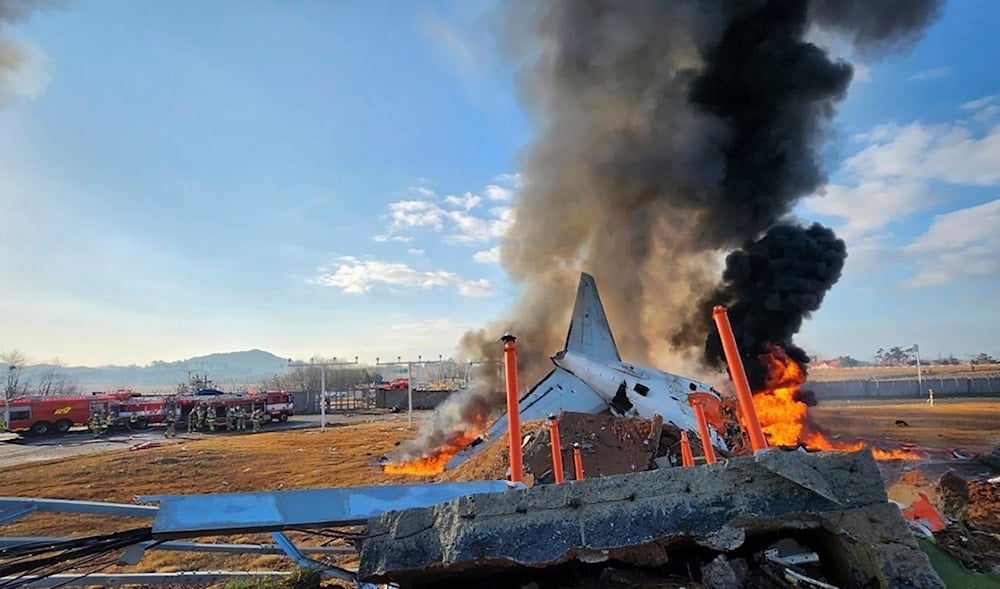179 presumed dead after Boeing 737-800 crashes in South Korea
Out of the 181 passengers aboard, 120 bodies were recovered, while 59 remain missing, all of whom are presumed dead.
-

In this photo provided by South Korea's Muan Fire Station, a passenger plane is in flames at the Muan International Airport in Muan, South Korea, on December 29, 2024. (AP)
All but two of the 181 passengers on board the Jeju Air flight from Bangkok are presumed dead after the plane crashed while attempting an emergency landing at Muan International Airport in South Korea, Yonhap News reported on Sunday.
Rescue teams are still searching through the wreckage, where additional bodies remain trapped in the fuselage. Only a passenger and a crew member were rescued from the tail section and are currently being treated at a nearby hospital.
Fire authorities recovered a total of 120 bodies, while 59 are still missing. The death toll, meanwhile, includes 54 men, 57 women, and nine others whose gender could not be identified immediately.
The fate of those missing is yet to be determined, although authorities informed their families that their chances of survival are virtually nonexistent due to the crash and the fire afterward.
The flight was chartered by a Boeing 737-800, which attempted an emergency belly landing at approximately 9:03 am local time, reportedly due to a failure in its landing gear deployment.
Eyewitnesses described hearing loud bangs moments before the aircraft collided with the airport's perimeter wall, splitting into two pieces and erupting in flames. Footage broadcasted by MBC suggests a possible bird strike as the plane descended. Authorities continue to investigate the cause of the crash.
South Korea’s acting president, Choi Sang-mok, declared Muan as a designated disaster zone, activating the government’s highest-level response in what has transpired to be the country's worst aviation crisis.
BREAKING: Video shows crash of Jeju Air Flight 2216 in South Korea. 181 people on board pic.twitter.com/9rQUC0Yxt8
— BNO News (@BNONews) December 29, 2024
Boeing needs to make 'significant changes': US Aviation chief
US Federal Aviation Administration Administrator Michael Whitaker previously voiced concern over Boeing's safety record, saying the airliner must make substantial reforms and modify its culture to enhance safety and production quality.
"As a result of systemic production quality issues, Boeing must make significant changes to transform its quality system and ensure the right layers of safety are in place," Whitaker said. "There must be a shift in the company's safety culture to holistically address its systemic quality assurance and production issues."
During the session, lawmakers voiced concern about Boeing's poor safety record. According to House Committee on Transportation and Infrastructure Chairman Sam Graves, US aviation has long been considered the gold standard, but recent accidents "have called that into question."
Boeing has faced several safety violations and criminal prosecutions in recent years.
In July, Boeing and the US government finalized a plea deal involving the planemaker admitting to conspiracy to defraud the United States. As part of the plea deal, Boeing will pay a fine between $243.6 and $487 million and would be subject to oversight by an independent monitor for three years.
Read more: Boeing faces possible criminal indictment

 3 Min Read
3 Min Read








